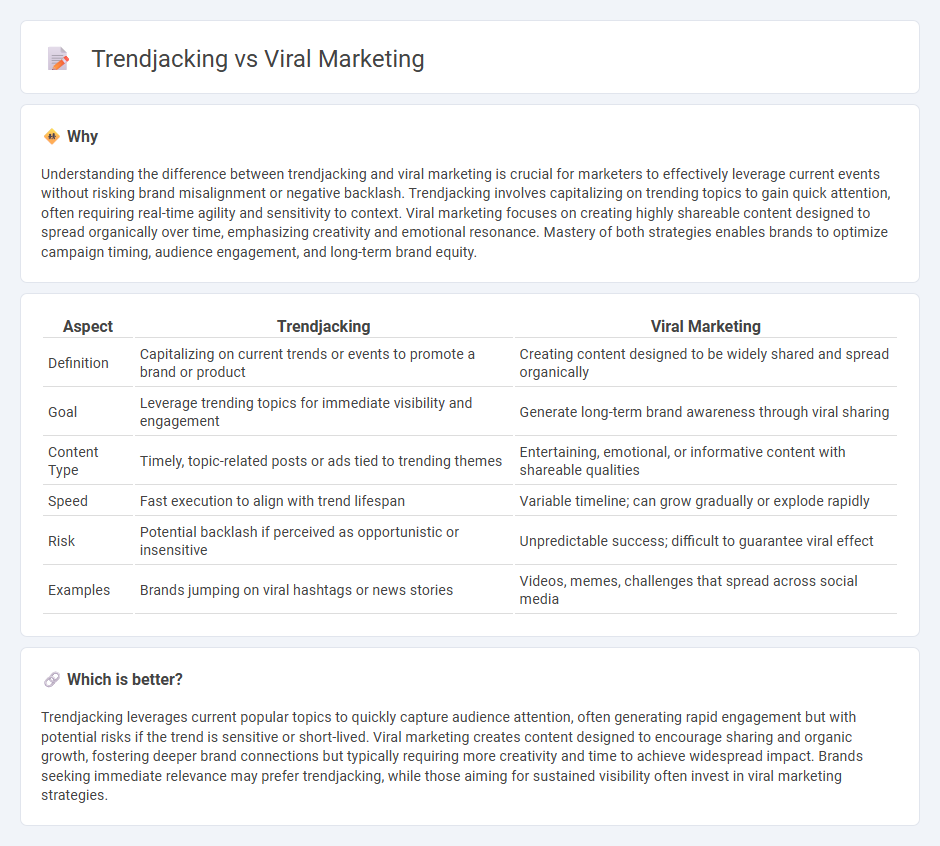
Trendjacking leverages current popular topics to boost brand visibility by aligning marketing campaigns with trending news or events, while viral marketing focuses on creating highly shareable content that encourages rapid user-driven dissemination. Both strategies aim to maximize audience engagement and increase brand reach, but trendjacking depends on timely relevance, whereas viral marketing relies on compelling creativity and emotional resonance. Discover effective ways to implement trendjacking and viral marketing to elevate your brand's presence.
Why it is important
Understanding the difference between trendjacking and viral marketing is crucial for marketers to effectively leverage current events without risking brand misalignment or negative backlash. Trendjacking involves capitalizing on trending topics to gain quick attention, often requiring real-time agility and sensitivity to context. Viral marketing focuses on creating highly shareable content designed to spread organically over time, emphasizing creativity and emotional resonance. Mastery of both strategies enables brands to optimize campaign timing, audience engagement, and long-term brand equity.
Comparison Table
| Aspect | Trendjacking | Viral Marketing |
|---|---|---|
| Definition | Capitalizing on current trends or events to promote a brand or product | Creating content designed to be widely shared and spread organically |
| Goal | Leverage trending topics for immediate visibility and engagement | Generate long-term brand awareness through viral sharing |
| Content Type | Timely, topic-related posts or ads tied to trending themes | Entertaining, emotional, or informative content with shareable qualities |
| Speed | Fast execution to align with trend lifespan | Variable timeline; can grow gradually or explode rapidly |
| Risk | Potential backlash if perceived as opportunistic or insensitive | Unpredictable success; difficult to guarantee viral effect |
| Examples | Brands jumping on viral hashtags or news stories | Videos, memes, challenges that spread across social media |
Which is better?
Trendjacking leverages current popular topics to quickly capture audience attention, often generating rapid engagement but with potential risks if the trend is sensitive or short-lived. Viral marketing creates content designed to encourage sharing and organic growth, fostering deeper brand connections but typically requiring more creativity and time to achieve widespread impact. Brands seeking immediate relevance may prefer trendjacking, while those aiming for sustained visibility often invest in viral marketing strategies.
Connection
Trendjacking leverages current popular topics or events to boost brand visibility, aligning closely with viral marketing strategies that aim to rapidly spread content across social networks. Both approaches capitalize on real-time audience engagement and shareability to amplify message reach and influence consumer behavior. Effective use of trendjacking can catalyze viral marketing campaigns, driving exponential growth in brand awareness and customer interaction.
Key Terms
**Viral Marketing:**
Viral marketing leverages compelling content designed to rapidly spread across social networks by encouraging user sharing, resulting in exponential brand visibility and engagement. Key components include emotional appeal, shareability, and targeted audience alignment to maximize organic reach. Discover more about crafting effective viral marketing strategies to elevate your brand's online presence.
Shareability
Viral marketing leverages highly shareable content designed to naturally spread across social networks, maximizing audience engagement through emotional appeal and relevance. Trendjacking capitalizes on current trending topics or viral phenomena by injecting brand messaging, aiming to boost visibility through timely alignment with popular conversations. Explore strategies to enhance shareability and harness these techniques effectively for your marketing goals.
Word-of-Mouth
Viral marketing leverages organic word-of-mouth to rapidly spread brand messages through engaging content that resonates emotionally with audiences, fostering genuine consumer advocacy. Trendjacking capitalizes on current viral trends by quickly inserting a brand's message or product to gain visibility, often relying on timely relevance rather than deep engagement. Explore effective strategies to harness both viral marketing and trendjacking for maximizing word-of-mouth impact.
Source and External Links
Viral marketing - Wikipedia - Viral marketing is a business strategy that leverages existing social networks to promote products, spreading information like a virus primarily via social media and word of mouth, aiming to engage individuals with high social networking potential for rapid dissemination without necessarily paying for distribution.
How to Use Viral Marketing To Get Consumers' Attention - Shopify - Viral marketing creates content designed to spread quickly across social platforms organically, typically videos, with success measured by organic reach and engagement rather than paid advertising.
Viral Marketing: Advantages, Disadvantages, Examples and FAQs - GeeksforGeeks - Viral marketing harnesses captivating, share-worthy content distributed via social networks and word-of-mouth to achieve exponential reach and brand recognition through voluntary sharing and online community influence.
 dowidth.com
dowidth.com